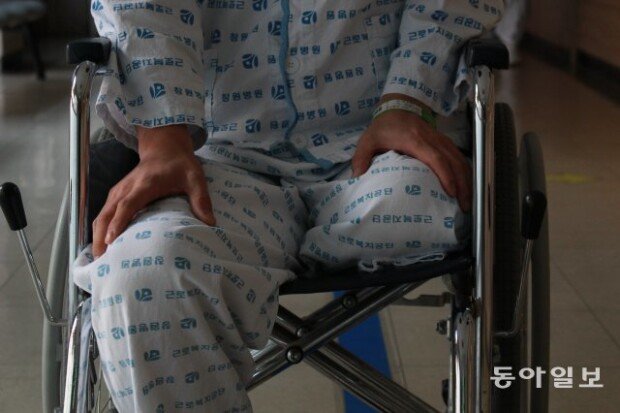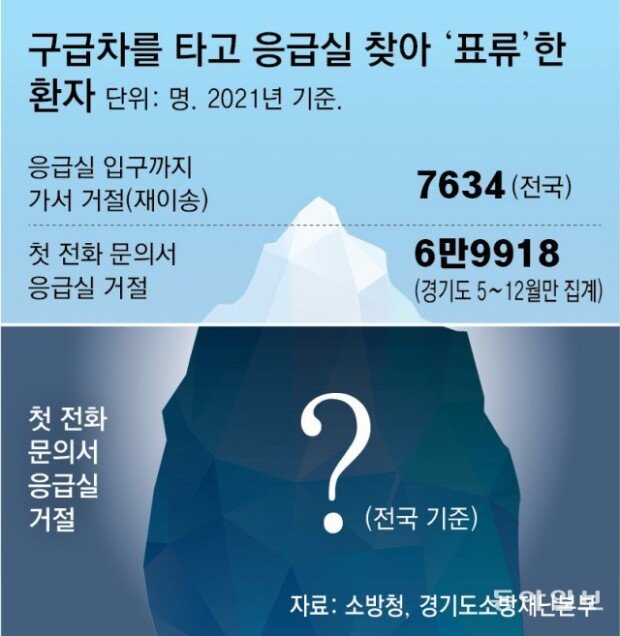Suffering continues even after ‘drifting in emergency room’ ended
Suffering continues even after ‘drifting in emergency room’ ended
Posted April. 04, 2023 08:08,
Updated April. 04, 2023 08:08

“Mom, I am alive!”
Lee Joon-gyu in Ajou University Medical Center consoled his mom with an innocent smile on March 10. His mom, Choi Yoon-yeong, who is taking care of him while he receives rehabilitation therapy, was overwhelmed with sadness. She turned her head and wiped her tears.
A 228-minute ‘drift’ Lee experienced in an emergency room after collapsing from a stroke on December 8 last year upended Lee and his family’s lives.
Lee woke up miraculously after surgery. However, he now struggles with climbing a step or recalling a simple word. He was a mature kid who used to swim every day and help his mom but is now a helpless child. Lee who doesn’t remember what happened on the day of his accident asks his mom why his mom is crying whenever she sheds tears.
Even after the end of the ‘drift,’ the suffering left by the ‘drift’ is deep and painful. It is the same for Park Jong-yeol who lost his left leg. He finally found a doctor after a drift of 378 minutes on October 25 last year but his leg couldn’t be saved. The helpless memories of the day and anxiety about the future torment Park. He said he only cried once after the accident because he was holding tears not to make his wife and children worried. One day, he couldn’t hold them in any more, so he went outside to a busy street in a patient gown and cried his eyes out. Five months after the accident, he is still receiving psychiatric treatment.
This was the pain that could have been avoided if they had received proper treatment within the golden time. It is also unknown how many people are suffering from such pain. Lee and Park were the two ‘drift’ patients whom the Dong-A Ilbo’s Hero Content team met in emergency care sites. However, there is no official statistic about how many people have had such experiences.
“I live in Korea, but I felt like I was not a Korean citizen at the time,” said Park to a reporter, recalling that day.
“What if my kids get hurt later? I can’t sleep at night because I am worried,” said the reporter.

● After the drift
(Lee Joon-gyu)
“Mom, why is my hair so short?”
Lee opened his eyes and asked Choi. Stitches were clearly seen between his short hair. Lee hovered between life and death while he received surgery to open his skull and stop bleeding from cerebrovascular. Lee found odd his new appearance reflected in the mirror as he didn’t remember what happened on December 8.
Unlike Lee, Choi recalls every single minute of the day when Lee collapsed.
“We finished the surgery. We are not sure if he will wake up.”
The doctor told Choi who had been waiting in front of an operating room for five years. She was already told that the chance of him dying was 40 percent. It was expected as they couldn’t find a hospital to accept him after his cerebrovascular burst. So, she prayed. She prayed for him to be alive and be with her even if he couldn’t speak or suffered any disabilities. When she had to sign a consent form for another surgery a week later when his condition got worse, that was all she prayed for. It felt like the biggest miracle that she could hope for.

Lee woke up 13 days after the surgery at Ajou University Medical Center.
Lee couldn’t recognize his mom for some time, even after he gained consciousness. He couldn’t speak and slept all day. As he recovered his cognitive ability, he started to recognize his mom and remember his friends. He began to talk slowly. He kept asking the same questions over and over again because of his shortened memory span, but Choi was only grateful.
On January 10, 33 days after he was hospitalized at Ajou University Medical Center, Lee returned to his home in Hwaseong, Gyeonggi Province. Choi couldn’t leave him alone. Lee said he got a headache even after looking at his phone for a while. He struggled with just climbing a single step. Choi was always worried about him. What if he collapses again? What if they can’t find a hospital to accept him again? She had to keep him with her all the time not to repeat that day. She should be able to bring him to a hospital at any time.
Choi got approval from her boss to bring him with her to work. Lee who became like a little kid sat next to his mom’s car during her commute and looked outside. Choi is concerned, looking at her son, who is now almost as tall as she is, taking wobbly steps, but Lee is just excited at the snacks given by her colleagues.
It was better that Lee didn’t know. Lee doesn’t remember the day when he couldn’t go to school because of a headache and helplessly lay on a bed in a still emergency room while his heart rate slowed down. Choi still has nightmares of the day, but it is enough that Lee doesn’t remember that pain.

(Park Jong-yeol)
“Dad, when are you going to put on a robot leg?”
The eldest child, a six-year-old tagging along the wheelchair, asked Jong-yeol with his eyes wide open. The younger child, who is two years old, stayed in his arms. The children are simply happy to see their father after two months. It is like a Christmas present delivered a day late. In 52 days after Jong-yeol suffered blood vessel injury in Gimhae, Gyeongnam and managed to find an operating doctor at the Chungbuk National University Hospital, he returned home.
Jong-yeol cannot forget the day of the accident. It was 2 a.m. on the following day when his blood vessel reconstruction operation ended. He was told that there was a 90% change of leg amputation. It was not a surprise, considering that he spent more than six hours with his blood vessel cut open. However, he did not give up hope. He clung onto the hope of 10% as he underwent two more surgeries to reconstruct his blood vessel.

It was on the fourth day of his arrival at the hospital when his left leg was amputated. Jong-yeol was discharged after his surgery and transferred to the Korea Workers’ Compensation and Welfare Service Hospital in Changwon. He decided to wear an artificial leg as he waited for his wound to heal.
Though he did not dare tell his family, Jong-yeol preferred the hospital to his home. He had his son stand in front of his left leg as they waited for the elevator in the building. He felt as though people were staring at his leg. He needed his crutches to get a glass of water and crawled to the bathroom. Searching for a new job, not being able to play billiards or go camping with the kids…these were concerns that could be put off. For the moment, he simply couldn’t accept the change to his body.
He felt anger erupt inside him at times. He wanted to ask the question why he had to amputate his leg. He read a posting by a patient who had his leg amputated in the exact same area. The patient said that he had an accident in Seoul but was carried to a hospital in Gyeonggi on a helicopter. “I searched for a hospital all day and was carried by an ambulance. Is it my fault that I don’t live in a big city? What will happen to my son if he gets hurt? Should I have to wait until Monday if he gets hurt on the weekend?”
His thoughts kept him awake at night. He also suffered from phantom pain. His left leg, though gone, felt numb and hurt. It felt like his severed blood vessel was beating. The pain grew worse on rainy days. He was surprised to find that exactly one minute had passed when he had suffered a long nightmare. In his dream, Jong-yeol worked as he did before the accident. The factory he worked for looked exactly the same and he had two healthy legs.

● Unrecoverable pain
(Lee Joon-gyu)
Your reporter met with Yoon-yeong, who visited Ajou University Hosptial for Joon-gyu's rehabilitation treatment.
“How have you been? Joon-gyu went back to school on Thursday last week. I spent a lot of time thinking whether he should go or not, because kids around his age get wild when they play. I was worried about Joon-gyu getting hurt if he fell. But I summoned the courage when the doctor told me it would be better for him. I told him to call me right away if he didn’t feel well, though,” she said.
Joon-gyu said his head hurt on the first day of school. He said it hurt even though the class just started. I’m worried of whether I should send him to an alternative school, but I’m not sure about him attending school far away. Joon-gyu doesn’t want to be away from his friends, either. He couldn’t even remember his friends’ names when he was at the hospital, but now he’s happy to see them.
“Work? I don’t take him to work because he goes to school now. My youngest child looks after Joon-gyu now. He’s entered middle school this year, so now they go to the same school. They go to school and come home together. His older brother looks after him well too. He’s a good cook and makes him dinner. Joon-gyu feels reassured. He has brothers to look after him.”
Joon-gyu keeps saying that he wants to go swimming, but I can’t let him go because I’m worried what would happen to him if he fell. Of course, it’s hard on him. He must feel so frustrated. He sits alone on the field at PE class. An athlete watching others play soccer. Still, I’m so worried for him. I’ve been through it- Joon-gyu passing out but no one could accept him. We can’t afford to let that happen again. When I think of that day…”

(Park Jong-yeol)
I reunited with Jong-yeol at Changwon Hospital on March 17, two seasons after the accident occurred.
“It's been four days since I received my prosthetic leg, but my wife only saw it for the first time today. During her previous visit, I couldn't wear it because I was moving around too much that day. However, now I'm excited to show her how well I can walk with it.
Wearing long trousers makes my prosthetic leg stand out, which makes me self-conscious. So my wife, Mi-ok, suggested that we add a mannequin leg to help conceal it. I cannot go out to even buy a pack of cigarettes. I still experience phantom pain. I feel anxious all the time.”
"I want to show you something interesting - I can cross my legs even with this prosthetic leg. My eldest son will be thrilled to see it, as he's been very curious about my robotic leg. However, I have to go back to work for my kids' sake. I don't want to work for the same company where I lost my leg - I can't lift heavy objects with this prosthetic as it is painful for me now. I've been told that the pain will eventually subside once a callus forms where my leg was amputated, so it'll get better."
"The leaves had started turning red when I got into the accident, but now the cherry blossoms are blooming.”

Today, the memory of that day when Yoon-yeong had to helplessly watch for 228 untreated minutes made her tear up. Jong-yeol still takes psychiatric drugs because of the experience of drifting untreated for 378 minutes. Joon-gyu, who isn't good at comforting his mother, smiled and said, “Mom, at least I'm alive!” Mi-ok comforted Jong-yeol by reminding him that he, too, is alive and that's all that matters.
Out of the 26 patients that the Dong-A Ilbo's Hero Content Team encountered over the past 37 days, who were left adrift with no help, three did not return to their loved ones.

● People who couldn’t come back
Choi Myeong-hee (alias 59), Park Seon-woo (alias 66), and Lee Na-eun (alias 3) were unable to return to their loved ones.
Myeong-hee called 119 on Monday night because of a severe headache. After undergoing scans at a nearby hospital, it was found that her brain blood vessels were blocked. Although she needed craniotomy surgery, which involves the surgical removal of part of the skull bone to expose the brain, no doctor could perform the surgery at the hospital. When she went to the second university hospital in Seoul, there was no available ICU spot. She was finally able to get the surgery at the third university hospital in the Gyeonggi area, but six hours had already passed since her scan. Four months later, she remains in a vegetative state.
"Grandma, give me your arm," Seon-woo's grandson says as he searches for his grandma who passed away every morning. He used to start his day with his grandma's arm wrapped around him. Sun-woo went into cardiac arrest at home last December after choking on food and not being able to breathe. She received CPR, but fell into a coma and needed to be taken to a larger hospital. After being rejected by four hospitals over three hours, she finally arrived at a university hospital in Gyeonggi, where she passed away.
Like Joon-gyu, three-year-old Na-eun, who was taken by ambulance with convulsions, died after an hour-long search for a hospital that would accept her. Eleven hospitals nearby refused to accept her, saying they didn't have a pediatrician.
Nobody knows how many patients wander in a life-and-death moment nationwide, looking for a hospital to take them. And there are no exact government statistics on it.


The National Fire Agency releases official data on 'rejections', which refers to the number of cases where an ambulance picked up a patient and arrived at the emergency room but was not admitted. The number was 7,634 in 2021 nationwide. However, this number is only a small part of the actual number of patients who wandered in an endless loop of ERs. This is because it only includes patients who actually showed up at the ER and were turned away. It doesn't include cases like Joon-gyu's, where the caller was turned away. This is because the paramedics don't have a record of the rejected calls.
There are figures that give us a glimpse of the actual "drifting." The Gyeonggi Provincial Fire and Disaster Headquarters internally collected the number of calls that were unaccepted on the first try between May and December 2021. The number was 69,918. Even during the shorter period of time, the figure was nine times higher than the rejection data of the National Fire Agency, which was 7,634.
There are also no proper statistics for patients like Jong-yeol who wander from hospital to hospital after getting injured. In the official statistics provided by the Central Emergency Medical Center, the "transfer rate of the four major emergency patients" is a tally of the number of patients who visited 165 regional emergency medical centers or regional emergency medical centers but transferred to other hospitals untreated. According to these statistics, there were 17,286 patients in 2021 alone. However, it does not count how many calls to hospitals they had to make from the emergency room and how many minutes it took for them to be transferred to the final treatment hospital after deciding on a hospital transfer. This means there is no way to know how long the golden time of these patients has been delayed, risking their lives.
We don't know how many patients in ambulances were treated in time to save their lives. Even when a patient fails to make it home safely, there isn't a single news article about it. Just like Joon-gyu and Jong-yeol, the pain of the family members left behind often goes unrecognized.
On March 19, a tragic incident took place in Daegu where a high school student suffered cardiac arrest after being drifted for two hours and 12 minutes. Sadly, her death went unrecognized until later. It's unsettling to realize that there could be many similar cases where patients have drifted and died unnoticed by the public. The fact that someone we know, a family member, friend, or neighbor, might be experiencing this ordeal at this very moment is concerning.







